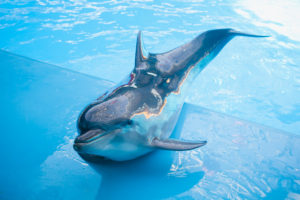Ric O’Barry: “Hollanda, Dolfinarium’u kapat!”
Ric O’Barry Hollanda’yı Dolfiarium’u kapatmaya çağırdı. Flipper’ın eski eğitimcisi ve günümüzün en önemli yunus koruyucularından olan O’Barry, Hollanda meclisi ile yaptığı bir görüşme sırasında bu isteğini dile getirdi. O’Barry’e göre yunusların esaret altında tutulmaları hayvan haklarına aykırı ve çok yanlış bir eğitim aracı.

Yunus hakları savunucusu O’Barry, 8 haziran Çarşamba günü PvdD millet vekili Frank Wassenberg ve VVD milletvekili Rudmer Heerema’nın davetlisi olarak mecliste Dolfinarium (Yunus gösteri parkı) hakkında bir konuşma yaptı. Birkaç sene yunuslarla çalıştıktan sonra hayatını akıllı deniz memelilerinin özgürlüğü ve korunmasına adayan O’Barry, yunus parklarının aslında maske arkasına gizlenmiş sirkler olduğunu, hayvanların refahını çok kötü yönde etkilediğini ve çocuklara çok yanlış mesajlar gönderdiğini vurguluyor. Bu parkların hayvanları esaret altında tutmanın ve onlara hükmederek baskı uygulamanın kabul edilebilir birşeymiş gibi yansıttığını ifade ediyor.
O’Barry hem insan hem de hayvan hayatında kendi kararlarını verebilmenin en temel unsur olduğunu savunuyor. Bu, esaret altındaki yunuslarda tam ters olarak uygulanıyor. Beton bir havuzda yaşamaya mahkum edilen yunuslar noraml davranış sergileyemiyorlar. O’Barry aynı zamanda bu esaret altındaki yunusların, beton duvarların sesleri ve sonar algıyıcılarını etkilemesi nedeniyle, birbirleriyle de doğru iletişim kuramadıklarını belirtiyor. O’Barry, dünyadaki en ilerici ve pek çok alanda öncü olan Hollanda’yı diğer ülkelere bu konuda öncülük etmesi için Dolfinarium’u kapatmaya çağırıyor. Hollanda’daki herkes bu gösterilere gitmeyerek bu girişime destek olabilir. Hayvanları Koruma Partisi olarak bu girişimi tüm kalbimizle sonuna kadar destekliyoruz.
Flipper
1960’lı yıllarda O’Barry beş tane yunusu kendisi tutsak edip dönemin en popüler dizilerinden olan Flipper için eğitiyor. Bu akıllı ve sosyal hayvanlarla çalışmak O’Barry’nin bakış açısını değiştiriyor. 70’li yıllardan itibaren kendisini, yunusların esaret altında tutulmasının ne kadar yanlış bir şey olduğunu mümkun olduğu kadar çok insana anlatmaya ve bu duruma son vermeye adıyor.
Ric O’Barry has called on the Dutch Parliament to close the Dolphinarium in the Netherlands. The global figurehead of dolphin protection and former trainer of the famous dolphin Flipper made his appeal during a meeting of the Dutch Lower House. O’Barry believes dolphin captivity to be animal-unfriendly and he feels that it sends the wrong message to our children.

At the invitation of MPs Frank Wassenberg (Party for the Animals) and Rudmer Heerema (VVD), dolphin protector Ric O’Barry has addressed the Dutch Lower House on the subject of the dolphinarium on Wednesday 8 June. O’Barry, who had worked with dolphins for a few years before deciding to dedicate his life to the freeing and protecting of intelligent marine animals, claims that dolphinariums are disguised circuses that are bad for animal welfare and send the wrong message to our children: they are taught that the captivity and domination of animals is acceptable.
O’Barry argues that the lives of both humans and animals are about making one’s own decisions. This is at odds with the lives of dolphins in captivity, which are spent entirely inside a concrete container. In this container, dolphins are unable to express normal patterns of behaviour. O’Barry also states that communication is very difficult for dolphins in a dolphinarium, as the sound of their sonar reverberates in the concrete container. That is why O’Barry has called on the Netherlands – “one of the most progressive countries in the world” – to set an example for the world by closing the Dolphinarium. Everyone in the Netherlands can contribute by not buying a ticket to a dolphin show. The Party for the Animals strongly supports O’Barry’s appeal.
Flipper
In the sixties, Ric O’Barry caught five dolphins from the wild, and trained them for his popular TV show Flipper. However, his contact with these social and intelligent animals made him change his mind, and since the seventies, O’Barry has dedicated himself to reaching as many people as possible about the adverse effects of dolphin captivity.